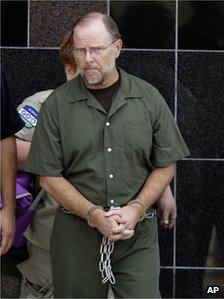Ex-Enron boss Jeffrey Skilling's sentence cut to 14 years
- Published

Skilling was originally jailed in 2006 for 24 years for his part in the Enron fraud
The prison sentence for the former boss of scandal-hit Enron has been reduced on appeal from 24 to 14 years.
Jeffrey Skilling presided over Enron when it became embroiled in one of the biggest corporate frauds in US history.
In return for the more lenient sentence, Skilling, who has been in prison since 2006, has agreed to stop appealing against his conviction.
Thousands of workers lost their jobs and retirement savings when energy firm Enron collapsed in 2001.
The company's implosion came amid revelations executives had covered up the shoddy state of its finances with accounting trickery and shady business deals.
The agreement between Skilling and federal prosecutors also allows more than $40m (£26m) seized from him to be distributed to the victims of the Enron fraud.
His prison term is now set to expire in December 2020.
He was able to push for a sentence reduction after an appeals court ruled in 2009 that a sentencing guideline had not been correctly applied in the original trial.
Corporate collapse
Jeffrey Skilling worked for Enron for 20 years and was chief executive for just six months, leaving the company four months before bankruptcy.
A jury in Houston, Texas convicted him in May 2006 on 19 counts of securities fraud, conspiracy, insider trading and lying to auditors.
The jury also found his predecessor as chief executive, Kenneth Lay, guilty of fraud and conspiracy. Lay died in July 2006 of a heart attack.
Enron's former chief financial officer, Andrew Fastow, testified against both Skilling and Lay and was sentenced to six years in prison.
He was released in December 2011. He declined to comment on Skilling's re-sentencing.
Enron was part of a series of corporate accounting scandals at the turn of the century that led directly to a raft of reforms, including the Sarbanes-Oxley Act of 2002.
- Published9 May 2013
- Published7 April 2011
- Published6 May 2010